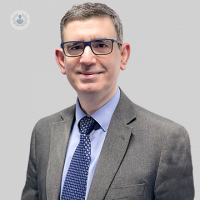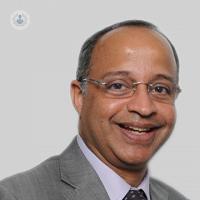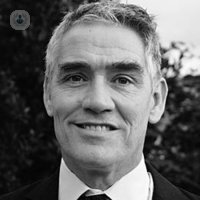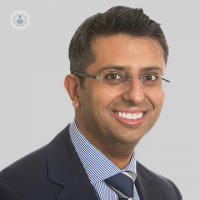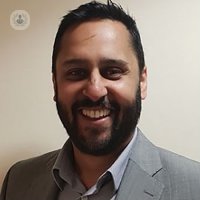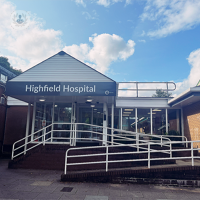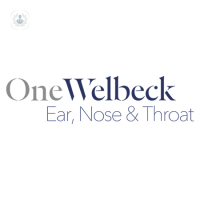What are nasal polyps?
Nasal polyps are semi-transparent growths that can form in any part of the sino-nasal mucosa. These are benign, but they may grow to the extent that they obstruct the nasal cavities. This condition is also called polypoid sinusitis. The polyps can develop at different sites in the cavities, but usually new ones develop further inwards, most typically on the roof and sides of the nasal cavities.
Nasal polyps can be treated by an ENT specialist.

What are the symptoms of nasal polyps?
Symptoms of nasal polyps vary according to their size. Initially, sense of smell and taste may be muted, which can then be accompanied by partial or complete nasal obstruction. You may also experience a sensation of constant mucus, which does not improve even when you blow your nose.
The presence of multiple or very large polyps may cause:
- a runny nose
- snoring
- a sensation of pressure in the forehead
- headaches
What are the causes of nasal polyps?
The causes of nasal polyps are not fully understood, but we know that it has to do with inflammation of the mucous membrane of the nose and sinuses. It is thought that people who develop nasal polyps might have a different immune system response or differences in the chemical build-up of their mucous membrane. There are also suggested links with infection, severe untreated allergies, asthma, and cystic fibrosis. Polyps can develop at any age, though they are more common in young and middle-aged people.
Can nasal polyps be prevented?
Prevention consists of treating diseases like allergy or asthma and following the required treatments. In addition, it is important to avoid nasal irritations and to practice good hygiene via nasal washes. It may also be helpful to use a humidifier at home to moisturise the nasal cavities. If the problem is an allergy, use of antihistamines, nasal aerosols and/or an anti-allergy vaccination may help to prevent nasal polyps.
How are nasal polyps treated?
Medical treatment is recommended according to the grade of the polyps. It may consist of a topical corticosteroid, an oral corticosteroid and/or antibiotics if there is sign of infection. If there is no response to treatment, a surgical treatment is recommended, which consists of removal of the nasal polyps and the opening of the paranasal sinuses using endoscopic techniques.
Which specialist treats nasal polyps?
ENT surgeons are the specialists that treat nasal polyps.
What might happen if nasal polyps are left untreated?
Thankfully, nasal polyps are not generally a serious medical concern. They can, however, frequently block one's nose if left untreated.
How will I know if I have a cold or nasal polyps?
The main difference between a cold and nasal polyps is that colds tend to generally clear up within a few days, whereas nasal polyps do not clear up themselves without treatment.
When should I see a doctor for nasal polyps?
Patients are urged to see their GP as soon as possible if the notice any of the following symptoms:
- difficulty breathing
- changes to sense of smell
- symptoms are not improving
Should I go to a pharmacist if I have nasal polyps?
Patients who present with nasal polyps are typically advised to see a pharmacist after they have had a consultation with their GP. A pharmacist can recommend remedies to help treat nasal polyps, such as:
- steroid nasal sprays
- salt water washes
Nasal polyps
Professor Vikas Malik - Otolaryngology / ENT
Created on: 11-13-2012
Updated on: 10-19-2023
Edited by: Conor Lynch
What are nasal polyps?
Nasal polyps are semi-transparent growths that can form in any part of the sino-nasal mucosa. These are benign, but they may grow to the extent that they obstruct the nasal cavities. This condition is also called polypoid sinusitis. The polyps can develop at different sites in the cavities, but usually new ones develop further inwards, most typically on the roof and sides of the nasal cavities.
Nasal polyps can be treated by an ENT specialist.

What are the symptoms of nasal polyps?
Symptoms of nasal polyps vary according to their size. Initially, sense of smell and taste may be muted, which can then be accompanied by partial or complete nasal obstruction. You may also experience a sensation of constant mucus, which does not improve even when you blow your nose.
The presence of multiple or very large polyps may cause:
- a runny nose
- snoring
- a sensation of pressure in the forehead
- headaches
What are the causes of nasal polyps?
The causes of nasal polyps are not fully understood, but we know that it has to do with inflammation of the mucous membrane of the nose and sinuses. It is thought that people who develop nasal polyps might have a different immune system response or differences in the chemical build-up of their mucous membrane. There are also suggested links with infection, severe untreated allergies, asthma, and cystic fibrosis. Polyps can develop at any age, though they are more common in young and middle-aged people.
Can nasal polyps be prevented?
Prevention consists of treating diseases like allergy or asthma and following the required treatments. In addition, it is important to avoid nasal irritations and to practice good hygiene via nasal washes. It may also be helpful to use a humidifier at home to moisturise the nasal cavities. If the problem is an allergy, use of antihistamines, nasal aerosols and/or an anti-allergy vaccination may help to prevent nasal polyps.
How are nasal polyps treated?
Medical treatment is recommended according to the grade of the polyps. It may consist of a topical corticosteroid, an oral corticosteroid and/or antibiotics if there is sign of infection. If there is no response to treatment, a surgical treatment is recommended, which consists of removal of the nasal polyps and the opening of the paranasal sinuses using endoscopic techniques.
Which specialist treats nasal polyps?
ENT surgeons are the specialists that treat nasal polyps.
What might happen if nasal polyps are left untreated?
Thankfully, nasal polyps are not generally a serious medical concern. They can, however, frequently block one's nose if left untreated.
How will I know if I have a cold or nasal polyps?
The main difference between a cold and nasal polyps is that colds tend to generally clear up within a few days, whereas nasal polyps do not clear up themselves without treatment.
When should I see a doctor for nasal polyps?
Patients are urged to see their GP as soon as possible if the notice any of the following symptoms:
- difficulty breathing
- changes to sense of smell
- symptoms are not improving
Should I go to a pharmacist if I have nasal polyps?
Patients who present with nasal polyps are typically advised to see a pharmacist after they have had a consultation with their GP. A pharmacist can recommend remedies to help treat nasal polyps, such as:
- steroid nasal sprays
- salt water washes
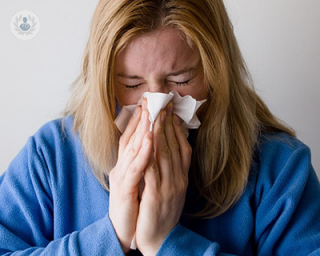

Nasal polyps: Your expert guide to symptoms and treatment
By Dr Fabio Fanfoni
2024-12-30
Revered consultant ENT surgeon Dr Fabio Fanfoni gives an expert guide to nasal polyps in this informative article, with specialist insight on symptoms and treatment. See more
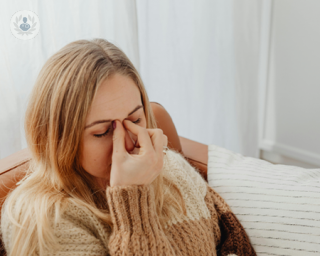

Loss of smell and getting it treated
By Mr Matt Lechner
2024-12-29
Anosmia, or loss of smell, is a condition that requires prompt medical attention due to its impact on quality of life. With appropriate diagnosis and treatment, many individuals can regain or improve their sense of smell, although some cases may result in permanent loss. In this informative article, leading consultant rhinologist and ENT surgeon Mr Matt Lechner provides a specialist's insight regarding effective management of this condition. See more
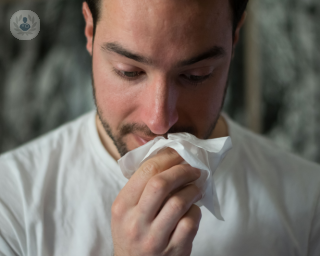

What are the top 5 causes of a blocked nose?
By Professor Paul Chatrath
2024-12-29
What could be causing your blocked nose? Prof Paul Chatrath is a distinguished consultant ear, nose and throat surgeon based in London and Essex. In this article, he lists the top five causes of a blocked nose. See more
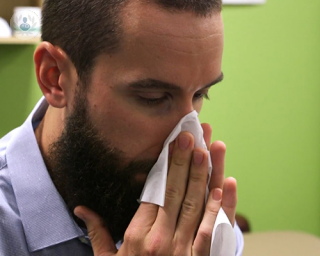

All you need to know about nasal congestion
By Mr Karan Kapoor
2024-12-29
In our latest article, highly esteemed Gatwick-basec ENT specialist, Mr Karan Kapoor, describes and reveals the main causes of nasal congestion, and explains why it is worse at night for many people. See more
Experts in Nasal polyps
-
Mr Abhijeet Parikh
Otolaryngology / ENTExpert in:
- Hearing loss
- Otosclerosis
- Cholesteatoma
- Rhinitis
- Nasal polyps
- Voice disorders
-
Mr Tony McGilligan
Otolaryngology / ENTExpert in:
- Nose
- Sinusitis
- Dysphagia
- Nasal polyps
- Neck lump
- Paediatric ENT
-
Mr Sam Khemani
Otolaryngology / ENTExpert in:
- Sinusitis
- Tonsillitis
- Paediatric ENT
- Glue ear
- Nasal polyps
- Hearing loss
-
Mr Samit Ghosh
Otolaryngology / ENTExpert in:
- Allergic rhinitis
- Sinusitis
- Rhinoplasty (nose job)
- Endoscopic sinus surgery
- Nasal polyps
- Nasal septal perforation
-
Professor Vikas Malik
Otolaryngology / ENTExpert in:
- Sinusitis
- Snoring
- Ménière's disease
- Ear infection
- Nasal polyps
- Voice disorders
- See all

The ENT Consultancy
The ENT Consultancy
23 Craven Rd, Reading
No existe teléfono en el centro.
By using the telephone number provided by TOP DOCTORS, you automatically agree to let us use your phone number for statistical and commercial purposes. For further information, read our Privacy Policy
Top Doctors

The Highfield Hospital - part of Circle Health Group
The Highfield Hospital - part of Circle Health Group
Manchester Road, Rochdale, Lancashire, OL11 4LZ
No existe teléfono en el centro.
By using the telephone number provided by TOP DOCTORS, you automatically agree to let us use your phone number for statistical and commercial purposes. For further information, read our Privacy Policy
Top Doctors

OneWelbeck Ear Nose & Throat
OneWelbeck Ear Nose & Throat
1 Welbeck St, London, W1G 0AR
No existe teléfono en el centro.
By using the telephone number provided by TOP DOCTORS, you automatically agree to let us use your phone number for statistical and commercial purposes. For further information, read our Privacy Policy
Top Doctors
-
The ENT Consultancy
23 Craven Rd, Reading , ReadingExpert in:
- Voice disorders
- Ear infection
- Hearing loss
- Adult and paediatric services
-
The Highfield Hospital - part of Circle Health Group
Manchester Road, Rochdale, Lancashire, OL11 4LZ , RochdaleExpert in:
- Cardiology
- Orthopaedic surgery
- Plastic surgery, reconstructive and aesthetics
- Dermatology
- Diagnostic Imaging
- Endocrinology
-
OneWelbeck Ear Nose & Throat
1 Welbeck St, London, W1G 0AR, W1G Marylebone LondonExpert in:
- Voice disorders
- Sleep apnoea
- Audiology
- Blocked nose
- endoscopy
- Otolaryngology
- Most viewed diseases, medical tests, and treatments
- Snoring
- Polysomnography (sleep study)
- Immunotherapy
- Nystagmus
- Migraine
- Minimal access surgery (keyhole surgery)
- Head and neck cancer
- Neck lump
- Botulinum toxin (Botox™)
- Thyroid disorders
